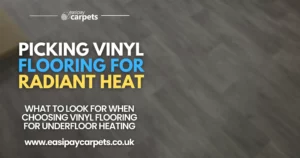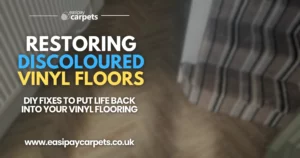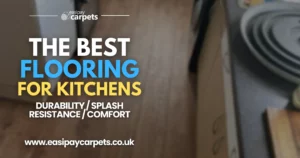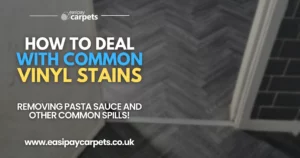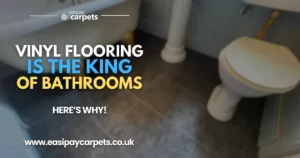
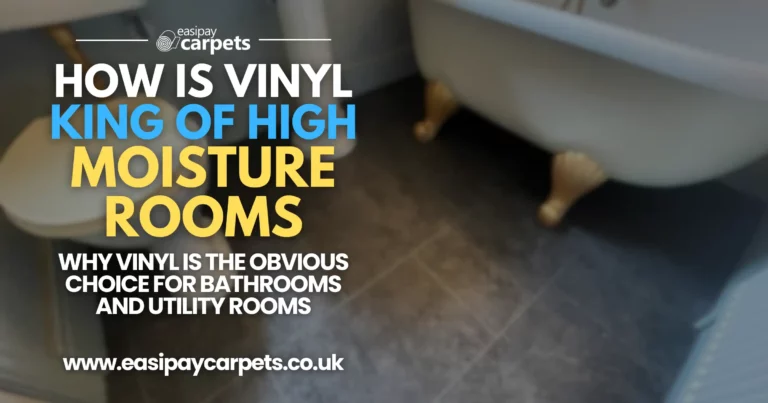
Why You Should Choose Vinyl Flooring For High Moisture Rooms!
When it comes to choosing flooring for high-moisture areas like bathrooms, kitchens, and basements, the options can seem overwhelming. You need a material that not only looks great but can also withstand the challenges of a wet environment. Vinyl flooring has emerged as a top contender for these spaces, offering a perfect blend of style, durability, and practicality. But is vinyl flooring waterproof? And why should you consider it for areas prone to moisture? Let’s explore the answers to these questions and more.
Is Vinyl Flooring Waterproof?
One of the most significant advantages of vinyl flooring is its water resistance. Vinyl flooring is made from polyvinyl chloride (PVC), a type of plastic that naturally repels water. This makes it inherently resistant to moisture, a key factor when considering flooring for high-moisture areas.
There are different types of vinyl flooring, including sheet vinyl, luxury vinyl tiles (LVT) and vinyl planks, both of which are designed to handle moisture effectively. Most modern vinyl flooring options are considered waterproof, meaning they can withstand spills, splashes, and even standing water without warping, buckling, or getting damaged.
However, it’s essential to note that while the vinyl material itself is waterproof, the seams between the planks or tiles may not be. Proper installation and sealing are crucial to ensuring your vinyl floor performs well in wet conditions.
The Benefits of Vinyl Flooring in High-Moisture Areas
Vinyl flooring has become a popular choice for bathrooms, kitchens, laundry rooms, and basements. Here are some reasons why vinyl flooring is ideal for these high-moisture environments:
-
Water Resistance
- As mentioned, vinyl flooring is highly resistant to water, making it perfect for areas where spills, splashes, and moisture are common. Unlike hardwood or laminate, vinyl won’t swell or warp when exposed to water, maintaining its appearance and integrity over time.
-
Durability
- Vinyl flooring is designed to be tough. It can withstand heavy foot traffic, making it suitable for busy households. Its scratch-resistant surface also makes it a good choice for homes with pets.
-
Easy Maintenance
- Cleaning vinyl flooring is a breeze. It doesn’t require special treatments or sealants to keep it looking its best. Regular sweeping and occasional mopping with a mild cleaner are all it takes to maintain its beauty. Since it resists stains, you don’t have to worry about spills causing permanent damage.
-
Comfort
- Vinyl flooring has a softer feel underfoot compared to tile or stone, making it more comfortable to walk on, especially in areas where you might be standing for extended periods, like the kitchen.
-
Affordability
- Vinyl is a cost-effective flooring option, offering the look of more expensive materials like hardwood or stone without the high price tag. This makes it an attractive option for homeowners who want both style and practicality.
-
Variety of Designs
- Vinyl flooring comes in an array of designs, colours, and textures. You can choose from styles that mimic the look of wood, stone, or ceramic tiles, allowing you to create the aesthetic you want without compromising on functionality.
Why Vinyl Flooring is Ideal for Specific High-Moisture Areas
Let’s take a closer look at why vinyl flooring is particularly well-suited for some of the most moisture-prone areas in your home:
-
Bathrooms
- Bathrooms are, without a doubt, one of the wettest areas in any home. Between steamy showers, splashes from sinks, and the occasional overflow, your bathroom floor needs to be up to the task. Vinyl flooring’s water resistance ensures that it won’t be damaged by these common occurrences. Plus, it’s easy to clean, meaning you can quickly wipe away any spills or condensation.
-
Kitchens
- The kitchen is another high-moisture area, prone to spills and splashes from cooking and cleaning. Vinyl flooring’s durability and water resistance make it an excellent choice here. It can handle everything from a dropped pot of sauce to the inevitable splashes from the sink. Additionally, vinyl’s softer surface is easier on the feet and back during long cooking sessions.
-
Laundry Rooms
- Laundry rooms see their fair share of moisture, especially if there’s a leaky washer or an overflowing sink. Vinyl flooring’s resistance to water and easy maintenance make it a practical choice for this space. Its durability ensures it can withstand the wear and tear of frequent foot traffic and the movement of heavy appliances.
-
Basements
- Basements are notorious for being damp, whether from groundwater seepage or humidity. Vinyl flooring is ideal for this space because it can handle the moisture without deteriorating. Additionally, many vinyl flooring options come with an underlayment that provides added insulation and comfort, making your basement more liveable.
Installing Vinyl Flooring in High-Moisture Areas
To get the most out of your vinyl flooring in high-moisture areas, proper installation is key. Here are some tips to ensure your floors perform well:
-
Subfloor Preparation: Make sure the subfloor is clean, dry, and level before installing vinyl. Any imperfections in the subfloor can affect the performance of your vinyl flooring.
-
Use a Moisture Barrier: In areas with high humidity or potential water seepage, consider using a moisture barrier underlayment to provide an extra layer of protection.
-
Proper Sealing: Pay attention to the seams between vinyl planks or tiles. Ensure they are properly sealed to prevent water from seeping through to the subfloor.
-
Professional Installation: If you’re unsure about installing vinyl flooring yourself, hiring a professional can ensure the job is done correctly, giving you peace of mind that your floors will stand up to moisture.
Conclusion
Vinyl flooring offers an excellent solution for high-moisture areas in your home. Its waterproof properties, durability, and ease of maintenance make it a practical and stylish choice for bathrooms, kitchens, basements, and laundry rooms. Whether you’re renovating an existing space or building new, consider vinyl flooring for a worry-free and long-lasting option that can handle the challenges of moisture-prone areas.
Easipay Carpets can help you get brand new flooring without the high up-front cost – by simply letting you spread the cost of the flooring over time instead. There’s no interest on our plans so you aren’t spending a penny more than you would buying it outright and we include underlay, door trims, carpet grippers and laminate beading for free. Prices start from just £10 per week!
It starts with a free home appointment and quote, to get booked in at a time that suits you, tap the “Get Started” button below and fill out the contact form!
Still Got Questions? Here's 10 FAQs!
Yes, most modern vinyl flooring options are waterproof, especially luxury vinyl planks and tiles. However, proper installation is crucial to ensure full water resistance.
Vinyl flooring is not typically recommended for inside showers but is excellent for bathroom floors outside the shower due to its water resistance.
Both vinyl and tile are great for high-moisture areas, but vinyl is softer underfoot, warmer, and generally easier to install.
While not always necessary, an underlayment can provide additional moisture protection and comfort, especially in basements and other high-moisture areas. Most of the time vinyl flooring will not require an underlay.
Yes, vinyl flooring can be installed over existing tiles as long as the surface is smooth and level.
With proper care and maintenance, vinyl flooring can last 10-20 years in high-moisture areas.
It’s not recommended to use a steam mop on vinyl flooring as the heat and moisture can damage the adhesive.
Vinyl flooring itself doesn’t require sealing, but ensuring the seams are properly sealed during installation is important for moisture protection.
Vinyl flooring can be slippery when wet, especially if it has a smooth finish. Consider options with textured surfaces for better slip resistance.
Vinyl flooring can resist water, but prolonged exposure to flooding may cause issues, particularly at the seams. It’s best to dry and clean the area quickly to prevent damage.
